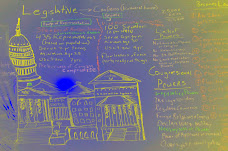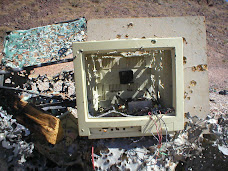Dear Kingman Readers:More or less two months ago I read a fellow blogger’s column in my hometown Kingman Daily Miner: Edward Tomchin’s “An Open Letter to Michael Moore regarding his latest offering, Capitalism, A Love Story.” Tomchin hadn’t liked Moore much and preemptively disparaged Moore’s upcoming film. I then took umbrage, being a big fan. Neither of us had seen the movie at that point. There was some spirited debate online. A variety of readers weighed in, which was all cool. Nearly two months ago.BUT, on many levels, as soon as I hit the “send” button and whisked away my snappy little missive to splatter all over that other guy’s page, I felt like a doofus putting myself out there defending Moore’s latest since I also had not seen it. Sure I got to take the high minded approach of saying don’t condemn the thing until you’ve seen it; but what if it did suck?So, knowing the chances of catching it at the local theater on Stockton Hill Road were about as great as seeing Nancy Pelosi kissing babies in the Andy Devine Parade, the very next weekend, while out of town, I saw the film. I haven’t been the same since. And have not known what to write since. So now after more than 8 weeks of deliberation on the issue, I can render a verdict. Forgive me Edward Tomchin. You were right. You said Moore would work against Capitalism in his film, that he would trash Capitalism, he‘d wreck it. He does, Moore makes an absolute mess of it. Capitalism is clearly Michael Moore’s weakest film since 1997’s The Big One. Which is a shame, because it’s also his most important, about the most important topic anyone can even discuss about the life of our country, despite being comparatively weak next to his other recent work (Fahrenheit 911 and Sicko). Which is so disappointing because this is a topic so serious that it makes Bowling for Columbine and The Big One seem trite in comparison. Unfortunately, Capitalism makes those films look like Truffaut. Of course, Tomchin was right, a person does not have to see the film to know Michael Moore purported premise: capitalism is killing America. And No, as I expected, when referring to the concept of “capitalism,“ Moore is not talking about your average mom and pop business where everybody works their hardest because they love each other and love what they do. And neither he nor I are not talking the diligent inventor who toils away his nights to create a device that improves life on this planet and thus deserves compensation; but he is talking about companies that get richer taking out insurance policies that bet on their employees dying while they leave the surviving widows and orphans penniless to cope. We’re talking an economic enterprise that is preparing to reward its “talent” with billions of dollars in bonuses because that talent figured the way to make money off of rendering another American family homeless every 7 and one half seconds, about the time it took to read these words. All in the name of a bottom line. We’re talking the kind of mentality that America has been taught to think of as success, a kind of capitalism as a vampirism: sucking the vitality of a society away. Rest assured, Moore has the super-sobering goods on the super elites whose money makes this happen, the fabled 1% who now control more than 90% of the rest of us and are ruining everyone’s life in the process. Thanks to a leaked Citigroup memo that is a centerpiece in Moore’s case against unfettered free markets we now know this cabal see the world as a “Plutonomy,” with its greatest threat being that the other 99% of us still vote. As Warren Buffet once said and Moore quoted in the closing credits, “There’s a class warfare all right, but it’s my class, the rich class that’s making the war and we’re winning.”That one quote by itself, (originally appearing in a New York Times article by conservative humorist Ben Stein--btw, not made-up by Moore, as his numerous detractors might have you believe) should be enough to prove the scary reality that the robber class rich are destroying the lives of the rest of us and have taken control of our government via Goldman-Sachs and our millionaire class congress. This crisis in our country is so urgent an issue that it should be required viewing for every American before it’s too late. Yes, required viewing for every American, especially the patriots who mistake their love of our country with their allegiance to a rigged economic system that insults the name “free market.” It’s the same thing those liberal agitators have been saying since history. And they’ve always been right. The difference is that at this time the gap between rich and poor is widening rapidly because in addition to buying everything else, the rich have also purchased Congress to tip the tables even further in their direction and as the crap rolls downhill it is fouling everyone else’s next. So many of the problems that our country and our world are facing are generated by the rich and won’t be solved as long as they can profit. Climate change, health debacle, housing crisis, credit crunch, all manufactured by the elite for their own benefit, at our expense. If these problems are not solved soon there may not be a world left for the meek to inherit. And all this urgency of message rest upon the shoulders of the most widely reaching liberal ideologue pundit provocateur in America, Michael Moore. Funny thing that the conservative Michael Moore haters fail to realize about his films and message is that the serious left dismiss him as a hack, frequently complaining about the same issues the right dislikes. The true beret wearing Sartre quoters carry laundry lists of the flaws in his films, which they are as happy to read riot to you any time you say something nice about the guy.Understand, I am not just familiar with Michael Moore. And I didn’t get my info on him from Rush or O’Reilly either. I am more or less a fan. I’ve seen everything since Bowling For Columbine, some of the earlier stuff and own a couple DVDs. Seeing Fahrenheit 911 with my son its opening weekend back in ‘04 is easily one of the most powerful movie experiences I ever had. I later conducted screenings of that film at the local community college. I’ve also shown Sicko several times to houseguests here at the themepark, including one screening with one of the doctors from the film’s Cuban scenes watching it with us while she was in town for a visit. Further, I’ve read 3 of Moore’s books and own a couple of others, been to his website on and off since the Iraq War began, and even written him fan letters.Including one in the middle of week four and five of not finishing this column.But also understand: even though I love his ideas, I haven’t always loved each art work. Moore is a master of mixing mind boggling facts and outrages, gotcha video, with droll commentary and comic stock footage till he comes to the big sell at the end, but he also tends toward shambling slack narrative, simplification to the point of parody and a kitchen-sink aesthetic, where he throws all sorts of scenes together that seem to relate to a topic, whether they advance the clear-line narrative or not. It works or it doesn’t. By those standards, the meticulous construction of Fahrenheit 911 and the scope of Sicko are works of art. Capitalism is not.On the plus side he won an Oscar, a Palm D’Or at Cannes, and thirty-one other prizes. On the other hand Moore’s work is often poorly supported by those on the left you should be his biggest fans and positively detested by those on the right, without any consideration to the points Moore labors to make. As critic Leslie Felperin explained in Variety, even those who “agree with Moore's politics, just can't stomach his oversimplification, on-the-nose sentimentality and goofball japery." In specific I have my own laundry list of faults in this film and despite my love for his passion and praises for his efforts to bring these issues to a public light, after now two months, I still can’t get over them. We teach our school kids that the opening and closing sentences in an essay are the most important parts. Moore muffs the first so badly it challenges the viewer. Without much introduction or exposition the film opens with two set of vignettes: an old classroom video on the Fall of Rome with shock cuts of contemporary footage spliced in and a heart wrenching home video of an eviction taken from inside the house as the police arrive and start breaking in to serve the papers. Each piece is in itself amazing, but they don’t actually connect well and neither gets to the economics lesson we know the film is meant to be. And in the middle of them, somehow, Michael Moore chooses to play an lol-cats video. That’s right, the most important topic he has ever taken on, and the man’s not been a lightweight [pun intended], and here he breaks in the action to show us a cat flushing a toilet, like 5 times complete with crappy music. Having seen it twice, I can’t say that I ever recovered. It wasn’t the only weakness in the film (the under focused visit with the “Realty Vultures“ slime ball in a business suit stands out as another misdirection that dilutes impact of the stronger scenes around it), but starting off that way made this viewer weigh each questionable choices Moore made in making his film.Which brings up a second big little problem: cussing. Now as everybody freaking knows I flipping am not the flap afraid of an frog forking fouled-up f-word now and then; so this is not an issue of prudery. BUT, as far as I‘m concerned, profanity, violence and sexuality are all choices that must be justified as advancing the artwork. If they don‘t help the project they need to be jettisoned. When it comes to cinema, the issue of profanity can have direct immense impact on the type of audience a film attracts, so a choice to include cussing in a film should only be made if the profanity helps not hurts. There are some pretty clear lines regarding the ways films get rated and the audiences those ratings dictate. Cinephiles out there, I recommend Kirby Dick’s 2006 film, This Film Is Not Yet Rated, for the ins and outs of the ratings game. For the simple version look to John Travolta’s character Chili Palmer in 2005’s Be Cool, “you get one f-word in a PG-13 movie.” One. It is a line directors legendarily dance around, a mark Moore surely knows and yet crosses here, gratuitously, with three f-bombs tossed, one by Moore himself. They cluster in the middle of the movie, much as the three f-monsters huddled in one war zone scene in Moore’s Iraq War masterpiece Fahrenheit 911. And in both cases the cluster-f earned the films R-ratings, which cut the film’s viewership in a great big way.It is a very odd conscious choice. It bothers the firetruck out of me.This topic is so pertinent to our society that Moore has to get it right, right now. The whole “recession” with 10% unemployment numbers (some say the actual figure is already up to 17%). Biden now acknowledges it is the “depression” our country is going through, and this crisis is due to the long train of abuses from this same banking crowd who then repaying themselves for their own foolish losses at our expense because they also are running the government. While it is true our country has always in general been a self-made plutocracy since we broke free of the aristocracy of England, this current group, principally in the banking industry, are making decisions that imperil the public. Wall Street bankers began appropriating the White House as home turf during the Reagan years. Moore documents the distain in the interplay between Reagan and treasury Secretary Donald Regan with a moment of contempt on Regan’s part toward Reagan that is so scalding it almost made me feel sorry for the Gipper, even though I’d generally longed to see him indicted for Iran-Contra.Regan directed Reagan’s actions to free up the restraints corporate banking interests had had placed upon them to protect the public good. Bankers, principally for Goldman-Sachs, then enter the government and control the purse strings of government through Treasury or more insidiously through the Federal Reserve--which is not a part of the government at all, though it acts that way. These people control most of the money in America and thus control everyone else’s lives. And now they have found a way take the wealth away from the people and the same time they impoverish the people by rendering them homeless and jobless, creating public misery for profit. And yes, it really is a vast conspiracy.Vast is a key word here, because even though we want to consider a paltry number like 1% as statistically insignificant, when you’re talking a population of 300 million, it still adds up to something three million people, the richest three million people in America. Having already rigged the game to make sure they win, they’ve now taken to making money off of making sure the rest of us lose as well. For example their carefully manufactured mortgage crisis. The housing crash that involved banks selling each other bets on faulty mortgages that they wrote themselves, then selling those debts round robin till they rose on a mound of artificial value only to crash and need to be subsidized by the poor being thrown out of their houses. It’s like the Tulip Bubble all over again, it’s like the S & L Crisis all over again. Except worse, because the problem is now global and they are impoverishing the rest of us for this artificial money. Numbers like hundreds of millions are moved around like pawns by those who duke it out with everybody else’s money on Wall Street for prestige points in their joisting game; but here in the real world that hundred million wasn’t just some board marker, it was the life’s blood of families, millions of families destroyed for this theft, while the government endorses it and the citizens are sold to the corporations as fodder for their profit even if that profit means making society miserable. The health care industry makes profit off of keeping people sick, banks make profit out of throwing people out of their houses, successful companies make profit by laying off their workers.It’s a problem that is accelerating and we can’t count on the government to solve it without massive prompting because they are consciously among the crowd that is causing the problem to make a profit. Amy Goodman of Democracy Now recently reported that now 237 members of Congress are millionaires themselves with seven valued in the hundreds of millions. Of course we now live in a world where there are thousands of billionaires, most of the money made through artificial profit for them, bought by real-world suffering for us.Where do we go? Not long ago, while at the dermatologist’s, an older woman in front of me was lamenting loudly to the clerk about the co-pay. She explained she was a fixed income cancer patient, and the three and four $35 a pop co-pays a month were starting to add up. As she finished with the clerk she continued to lament, at which point I said, “Lady look, the rich people got the tax cut they bought for themselves and that’s the American Way. And as long as they can make money off of our suffering they’re not going to let us fix it.”There was an understandable silence following my remark. What could we say? The game was rigged. She paid her co-pay and we all shut up.What else was there to say? It has taken me months to figure out some way to overcome that silence. That silence also brings back to mind the biggest problem with Michael Moore’s movie, the other elbow of the parenthesis from that jarring opening act, that‘s right: the ending.Truth be told, in between the beginning and the ending Moore, who functions as an American Idol for instant-justice for the corporately abused, is a man with plenty of stories to tell and most of his segments in this outing do work fairly well. Some of the pieces he covers are terribly moving. In particular the grieving family of a dead cake decorator Wal-Mart made a mint off of the death insurance for and the evicted Peoria, IL who have to burn their own possessions as part of their eviction are hyperbolically heart-wrenching. Moore orders his arguments well as well, bringing in the religious case against the kind of capitalism being practiced by the plutocrats, the enormous social costs we are enduring, the historical evidence of its rise, the way propaganda campaigns have been used to sell the concept to us; and the basic anti-democratic nature of the whole enterprise. But he only taps the surface of the possible condemnations available by a scan of the numbers of the afflicted in the headlines. A topic like this: “how have the rich screwed us over today?” could have provided Moore not merely with more movie, but surely with an entire TV series, even a daily syndicated series.Instead Moore brings us a film with a modest two hour running time that attempts to bring us up to speed on a crisis that has taken decades to perpetrate. There are so many things he had to leave out, but for his finale Moore still breaks out his patented fat guy slapstick and begins mock harassing Wall Street: call in the keystone cops, Moore’s going to make a citizen’s arrest. At what appears to be about midway through a supposedly sidesplitting routine involving crime scene tape, however Moore pulls the film to a screeching halt and over a blackened screen says, “I don’t think I can keep doing this--”Which is exactly how it feels sometimes when I sit staring at monitors trying to make jokes about something that is no laughing matter. Moore gives himself a way out by adding, after a pregnant pause, “--without your help.” Then he tells up to hurry up and the credits roll. No further hope, no further discussion. He just throws up his hands and seems to walk away. Which is why the fact that the movie had movie flaws in it upset me so much I could not speak, or at least type on the subject. If Michael Moore is so overwhelmed he’s giving up what chance do I have? I attempted to do a piece on rightwingers’ outrageously shameful schadenfreude over Obama losing the Olympics, then it seemed he got the Nobel as a consolation prize and that felt ridiculous to try to defend, so nothing there. Though you’ve got to admit, in comparison it wouldn’t take much to look like a peace prize winner next to Bush. Heck even Mike Tyson seems in the “Sister Teresa” range next to Bush. By the time I tried to blend that all together it was called “Degree of Difficulty” and it lived up to its name.But something inside me makes me want to keep trying to change the world through my writing. Moore’s choice to film his disillusion and apparently leave us hanging, while quite effective theatrically, was in the end more of an artistic choice than a life choice. If he had truly been defeated there would have been no point in finishing the film, much less doing all the press over which is where, months ago, I entered this fiasco of a writers block. And I know I will not be free from this cursed topic till I completed this article. So dear Kingman readers, now I have done just that. To overcome the paralysis I had to write more about Moore, really I really wanted. I in fact have written the first and last word on “Moore” this round. I think I’ve tried to do justice by this topic and doubt I should or possibly could say any more.
--mikel weisser writes from the left coast of AZ.
Subscribe to:
Post Comments (Atom)










No comments:
Post a Comment